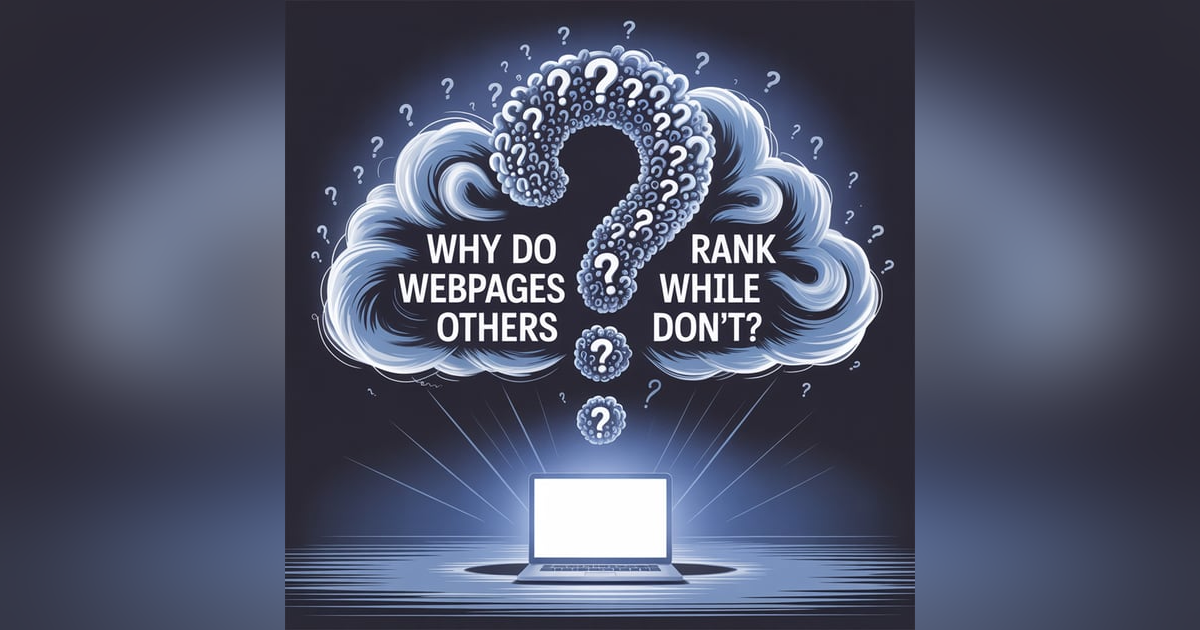SEO Secrets: Why Do Search Engines Rank Webpages Higher Than Others? Marketing Masterclass with Favour Obasi-ike


SEO Secrets: Why Do Search Engines Rank Webpages Higher Than Others? with Favour Obasi-Ike) | Get exclusive SEO newsletters in your inbox.
This discussion focuses on web page ranking and SEO strategies, particularly in the context of evolving search algorithms and AI. Favour highlighted the importance of domain authority and page authority, emphasizing that content needs to be contextual, comprehensive, and in multimedia formats to rank effectively.
They discuss practical tools like Google Search Console and SEOGets for analyzing website data and improving rankings. Additionally, the conversation touches on the accelerated pace of content indexing due to social media and podcasts, suggesting that unique analysis and experience, especially through quotes and diverse content clusters, are crucial differentiators in a world saturated with AI-generated content.
Next Steps for Digital Marketing + SEO Services:
FAQs on Elevating Web Page Ranking in the AI Era
1. Why do some web pages rank highly on search engines while others don't?
Web pages rank differently due to various factors that influence their visibility to search engine algorithms and users. Key reasons for higher rankings include strong domain authority, relevant and contextual content, the use of multimedia formats, and addressing user queries effectively. Conversely, pages may not rank well if their content is outdated, contains error messages or broken links, lacks credibility, or fails to provide the type of information users are actively seeking. Essentially, a page's ability to rank is a reflection of its usefulness, credibility, and technical optimization in the eyes of search engines.
2. What is "domain authority" and why is it important for web page ranking?
Domain authority refers to the credibility and trustworthiness of your entire website in the eyes of search engines. It's often represented by a score from 0 to 100, with a higher score indicating greater authority. A strong domain authority is crucial because it signals to search algorithms that your website is a reliable source of information. This trust is built through the credibility of your content and its context. A website with high domain authority can help its individual web pages rank more easily, even if a new page is just published, because the overarching trust established with Google (and other search engines) extends to all its content. Tools like Ahrefs can be used to check your website's domain authority.
3. How do content pillars and content clusters contribute to a webpage's ranking?
Content pillars and content clusters are strategic approaches to organizing your website's content to improve ranking. Content pillars are broad, foundational topics central to your business or niche. Content clusters are groups of related, more specific articles or pages that link back to a central pillar page. This structure creates a "roadmap" for both users and search engines, demonstrating a comprehensive understanding of a topic. By providing detailed, interconnected content around specific themes, you establish your website as an authoritative resource, allowing people to find you based on various related search queries, thus boosting your overall search visibility.
4. How can multimedia and different content formats improve web page rankings?
Incorporating multimedia and diverse content formats significantly enhances a web page's ranking potential. While basic text is important, pages that include elements like embedded YouTube videos, infographics, FAQs, pricing lists, and even quotes, offer a richer user experience. Videos, for example, generate captions (text within text), and podcasts can be transcribed, effectively creating "text to the power of three" (text, audio, video all contributing to textual content). This multi-format approach provides more context and content for algorithms to parse, caters to different learning preferences, and increases user engagement, signaling to search engines that the page is valuable and comprehensive.
5. What role do search engines like Google Search Console play in optimizing web pages for ranking?
Google Search Console (GSC) is a free and essential tool for website owners to monitor their site's performance in Google Search. It acts as the "internet service provider" for your website within Google's database. GSC provides valuable data on how users find your site, which queries they use, and how your pages are performing. By tracking queries, impressions, and clicks, you can identify what information people are seeking and then strategically create or refine content to address those needs. Submitting your sitemap and regularly checking GSC allows you to ensure your content is indexed, track its performance, and make informed decisions to improve rankings. Other search engines like Bing and Yandex also offer similar tools.
6. How can an individual's unique analysis and experience differentiate their content in an AI-driven world?
In an era where AI can rapidly generate vast amounts of content, unique analysis and personal experience have become paramount differentiators. While AI can produce factual information, it often lacks the nuanced insights, personal anecdotes, and real-world expertise that a human can provide. For instance, when discussing a topic like cooking eggs, an AI might list recipes, but a human can share their experience with different pan types or specific techniques that yield better results. Injecting your personal perspective, insights, and expert opinions into your content creates a level of authenticity and depth that generic, AI-generated content cannot replicate, making your pages more valuable and trustworthy to both users and search algorithms.
7. What are some actionable strategies for improving web page rankings quickly today?
The landscape of SEO has evolved, allowing for quicker ranking compared to a decade ago. Here are some actionable strategies:
- Utilize Google Search Console (GSC): Install GSC, analyze query and page data (potentially with tools like SEO Gets), and use AI to help create prompts for analyzing this data to build better web pages.
- Leverage Domain Authority: If you have a powerful website, new or revised content can rank faster due to Google's existing trust. Press releases can also help promote important content as news is a strong signal to search engines.
- Content Context & Clusters: Focus on creating contextual content around specific topics, using content pillars and clusters to cover subjects comprehensively.
- Multimedia Integration: Embed videos, infographics, and other visual or audio elements. Ensure these elements have accompanying text (captions, transcriptions).
- Answer User Queries (The 5 W's and 1 H): Create content that directly answers common questions people are asking, using the "who, what, when, where, why, and how" framework in your articles and URLs.
- Create "Tools" Content: Articles or pages about "tools" (free or paid) often attract significant traffic because users are actively seeking solutions.
- Consistency and Recurrence: Regularly update and create content, and don't be afraid to revisit and expand on successful topics over time.
8. How has AI impacted the way web pages rank, and what does it mean for content creators?
AI has significantly altered the ranking landscape. While traditional search engines (Google, Bing) remain crucial, AI search (like ChatGPT or Google Gemini) now plays a role in how information is discovered. For content creators, this means adapting to a system where "ranking" on AI might be more accurately described as "earning impressions" or "citations." AI models scrape data from existing online sources, so content that already ranks well on traditional search engines is more likely to be cited by AI.
This emphasizes the importance of:
- Traditional SEO Foundations: Continue to optimize for Google and other search engines, as they remain the primary data source for many AI models.
- Clarity and Intent: Create content that directly answers user questions in a clear, structured manner, as AI prioritizes direct answers.
- Attribution and Sourcing: Ensure your content is authoritative and properly attributed, so AI tools can confidently cite your work.
- Podcasts as a Ranking Tool: Podcasts, with their associated show notes and transcripts, are becoming a powerful way to rank quickly on both traditional and AI-driven searches, as they offer rich, contextual audio and text.
Digital Marketing SEO Resources:
See Privacy Policy at https://art19.com/privacy and California Privacy Notice at https://art19.com/privacy#do-not-sell-my-info.


